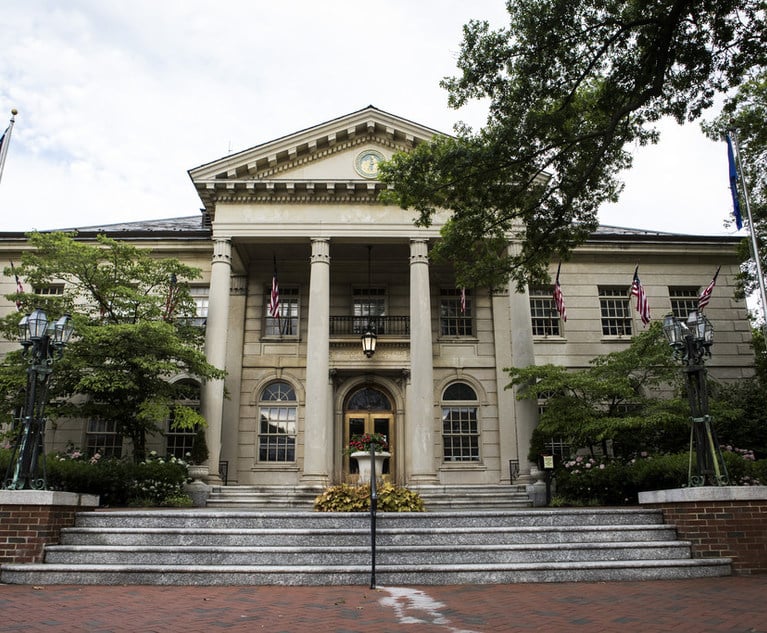A jury in Camden County, New Jersey, has returned a $21.8 million verdict in a suit claiming negligent stormwater management by the Borough of Haddonfield led to flooding that severely damaged four houses.
The plaintiffs were owners of properties inundated by floodwaters and fecal matter in a June 20, 2019 storm that caused backups in the borough’s stormwater management system.
The verdict could be a cautionary tale for municipal officials who prioritize showy expenditures like new playground equipment over less tangible ones like stormwater management, said plaintiff’s lawyer Robert D. Sokolove of Weir Greenblatt Pierce in Philadelphia.
Monopoly Houses and a Hot Dog Tray
Sokolove made his point for the jury with a low-tech visual aid constructed from green Monopoly houses and a paper hot dog tray from the court’s cafeteria.
The plaintiffs’ homes have been cleaned and repaired since the flood, but a stench of sewage remains.
A real estate expert testified on behalf of the plaintiffs that the four properties are not marketable, according to Sokolove, a former Federal Emergency Management Agency associate general counsel who handles flood-related litigation.
Sokolove tried the case with attorney Jennifer Hiller-Nimeroff of his firm.
Decades-Old Memo
The jury delivered a unanimous verdict following a 10-day trial before Superior Court Judge Michael Kassel.
Jurors found Haddonfield’s stormwater management system was a dangerous condition that caused the plaintiffs’ damages, and that its actions or inactions to protect against the condition were palpably unreasonable, Sokolove said.
The suit claimed Haddonfield officials did not know that a portion of the stormwater management system ran through the plaintiffs’ properties.
It also alleged the borough failed to perform any pre-flood monitoring, maintenance, inspection or cleaning of its stormwater management system, other than to clean sewer grates on the streets, said Sokolove.
And Haddonfield lacked measures such as retention basins to slow down the flow of stormwater during a major storm, Sokolove said.
Haddonfield countered those claims by asserting that the 2019 flood was unusually severe and the plaintiffs’ properties were harmed because they are situated on low-lying lands, Sokolove said.
Joshua Locke and Robert Gillispie of Donnelly, Petrycki & Sansone in Cherry Hill, representing Haddonfield, did not respond to calls about the verdict. Haddonfield’s Borough Administrator, Sharon McCullough, also did not respond to a call about the verdict.
The plaintiffs presented the jury with a memo written in 1994 by Joseph Keating, who was then Haddonfield’s director of public works.
In that document, Keating expressed concern about the area where the plaintiffs’ houses lie. He noted that the borough should take steps to lessen the risk of flooding in the area, Sokolove said.
“They just kind of ignored Joseph Keating and basically said, ‘Well, you know, you’re not an engineer, so we don’t really have to listen to you.’ The interesting thing is that you would think that we had that memo in our hands before we prepared the lawsuit, because everything we wrote in that complaint was borne out almost verbatim by this memo that we found during litigation,” Sokolove said.
“There’s very little political incentive sometimes for a governmental entity to say we’re going to spend a number of millions of dollars to solve a problem that you probably didn’t even know existed, and it doesn’t affect you anyway. And quite frankly, bluntly, some municipalities would prefer to not spend the money and then have some jury or judge order them to pay the money,” Sokolove said.
Weber’s Story
Before the 2019 flood, the plaintiffs’ four properties had market values of roughly $350,000, $700,000, $800,000 and $1.3 million, Sokolove said.
The jury awarded $1.9 million in economic damages to private property, in amounts ranging from $430,000 to $550,000, to the owners of the four homes. Jurors also awarded $16.5 million in damages to quality of life and other non-economic damages.
The largest portion of that award, $5.5 million, went to the family owning the most modest house, the one valued at $350,000.
Charles Weber had built that house himself and lived there most of his life, said Sokolove.
At the time of the 2019 flood, Weber was in his 80s and confined to a wheelchair, and he was forced to leave his home and spend the rest of his days in a nursing home, Sokolove said. Weber died after contracting COVID-19 in the nursing home, eight months after the flood, Sokolove said. His estate was awarded $2 million, and his two sons were awarded $2 million and $1.5 million.
“We’re not accusing Haddonfield of killing Mr. Charles Weber. What we are saying is that it certainly … forced him out of his house,” Sokolove said. “He was lucky to get out alive … so quickly, and he was in a wheelchair so they had they had to get him out of the house through [a] window onto dry land. And then you know, the house he built 60 years earlier is completely disrupted and his final days are in, frankly, a crappy nursing home filled with COVID. And then he dies.”


